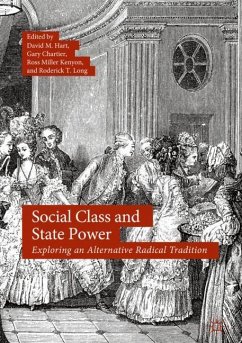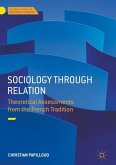Social Class and State Power
Exploring an Alternative Radical Tradition
Herausgegeben:Hart, David M.; Chartier, Gary; Kenyon, Ross Miller; Long, Roderick T.
Social Class and State Power
Exploring an Alternative Radical Tradition
Herausgegeben:Hart, David M.; Chartier, Gary; Kenyon, Ross Miller; Long, Roderick T.
- Gebundenes Buch
- Merkliste
- Auf die Merkliste
- Bewerten Bewerten
- Teilen
- Produkt teilen
- Produkterinnerung
- Produkterinnerung
This book explores the idea of social class in the liberal tradition. It collects classical and contemporary texts illustrating and examining the liberal origins of class analysis-often associated with Marxism but actually rooted in the work of liberal theorists. Liberal class analysis emphasizes the constitutive connection between state power and class position. Social Class and State Power documents the rich tradition of liberal class theory, its rediscovery in the twentieth century, and the possibilities it opens up for research in the new millenium.
Andere Kunden interessierten sich auch für
![New Ethnographies of Football in Europe New Ethnographies of Football in Europe]() New Ethnographies of Football in Europe38,99 €
New Ethnographies of Football in Europe38,99 €![International Practice Theory International Practice Theory]() Christian BuegerInternational Practice Theory30,99 €
Christian BuegerInternational Practice Theory30,99 €![Reimagining Class in Australia Reimagining Class in Australia]() Henry PaternosterReimagining Class in Australia67,99 €
Henry PaternosterReimagining Class in Australia67,99 €![Sociology through Relation Sociology through Relation]() Christian PapilloudSociology through Relation64,99 €
Christian PapilloudSociology through Relation64,99 €![Industrial Teesside, Lives and Legacies Industrial Teesside, Lives and Legacies]() Jonathan WarrenIndustrial Teesside, Lives and Legacies75,99 €
Jonathan WarrenIndustrial Teesside, Lives and Legacies75,99 €![Nationalisms in the European Arena Nationalisms in the European Arena]() Margarita Gómez-ReinoNationalisms in the European Arena82,99 €
Margarita Gómez-ReinoNationalisms in the European Arena82,99 €![European Civil Service in (Times of) Crisis European Civil Service in (Times of) Crisis]() Didier GeorgakakisEuropean Civil Service in (Times of) Crisis67,99 €
Didier GeorgakakisEuropean Civil Service in (Times of) Crisis67,99 €-
-
-
This book explores the idea of social class in the liberal tradition. It collects classical and contemporary texts illustrating and examining the liberal origins of class analysis-often associated with Marxism but actually rooted in the work of liberal theorists. Liberal class analysis emphasizes the constitutive connection between state power and class position. Social Class and State Power documents the rich tradition of liberal class theory, its rediscovery in the twentieth century, and the possibilities it opens up for research in the new millenium.
Produktdetails
- Produktdetails
- Verlag: Palgrave Macmillan / Springer International Publishing / Springer, Berlin
- Artikelnr. des Verlages: 978-3-319-64893-4
- 1st ed. 2018
- Seitenzahl: 372
- Erscheinungstermin: 18. Januar 2018
- Englisch
- Abmessung: 216mm x 153mm x 25mm
- Gewicht: 586g
- ISBN-13: 9783319648934
- ISBN-10: 3319648934
- Artikelnr.: 48607883
- Herstellerkennzeichnung Die Herstellerinformationen sind derzeit nicht verfügbar.
- Verlag: Palgrave Macmillan / Springer International Publishing / Springer, Berlin
- Artikelnr. des Verlages: 978-3-319-64893-4
- 1st ed. 2018
- Seitenzahl: 372
- Erscheinungstermin: 18. Januar 2018
- Englisch
- Abmessung: 216mm x 153mm x 25mm
- Gewicht: 586g
- ISBN-13: 9783319648934
- ISBN-10: 3319648934
- Artikelnr.: 48607883
- Herstellerkennzeichnung Die Herstellerinformationen sind derzeit nicht verfügbar.
David M. Hart, Director, Online Library of Liberty, Liberty Fund, Indianapolis, USA Gary Chartier, Distinguished Professor of Law and Business Ethics, La Sierra University, USA Ross Miller Kenyon, independent scholar and video producer, Los Angeles, USA Roderick T. Long, Professor of Philosophy, Auburn University, USA
Classic Works of Classical Liberal Class Analysis.- 1 Richard Overton, "Monopolists as Frogs and Vermin" (1641).- 2 Adam Smith, "On Conspiracies, Monopolies, and Unproductive Labour" (1776).- 3 Thomas Paine, "On Governments, Placemen, and Pensioners" (1792).- 4 William Godwin, "Of Courts, Subjects, and Pensions" (1793).- 5 Jeremy Bentham, "On Mischiefs and the Sinister Interests" (1817, 1824).- 6 Thomas Hodgskin, "On Obedience as the Object of Legislation" (1832).- 7 William Leggett , "The Lordlings of the Paper Dynasty" (1834).- 8 James Mill, "On Those Who Pillage and Those Who Are Pillaged" (1835).- 9 John Wade, "The Aristocracy and the Oligarchy" (1835).- 10 Adolphe Blanqui, "The Class Which Does Not Kill or Pillage" (1837).- 11 Richard Cobden, "England is a perfect Paradise for the Aristocracy" (1845-49).- 12 Frédéric Bastiat, "On the English Oligarchy and Legal Plunder" (1845, 1847) .- 13 John C. Calhoun, "Tax Payers versus Tax Receivers" (1849).- 14 Charles Renouard, "Robbers asParasites" (1852).- 15 Gustave de Molinari, "The Nobility as Conquering Plunderers" (1852).- 16 Augustin Thierry, "The Emancipation of the Bourgeoisie" (1853).- 17 Herbert Spencer, "On Class Bias and the Militant Type of Society" (1873, 1882).- 18 Lysander Spooner, "On Government as a Band of Robbers and Murderers" (1870, 1882).- 19 William Graham Sumner, "On Forgotten Men and Plutocrats" (1883).- 20 Benjamin R. Tucker, "The Four Monopolies: Money, Land, Tariffs, and Patents" (1888).- 21 Vifredo Pareto, "The Decline and Rise of Elites" (1900).- 22 Franz Oppenheimer, "The Economic versus the Political Means of Acquiring Wealth" (1908).- 23 Albert J. Nock, Our Enemy, the State (1935).- 24 Ludwig von Mises, "On Castes, Classes, and Group Interests" (1945).- Contemporary Interpretations of Classical Liberal Class Analysis.- 25 Murray N. Rothbard, "The Anatomy of the State" (1965).- 26 Roy A. Childs, "Big Business and the Rise of American Statism" (1969, 1971).- 27 Walter E. Grinder and John Hagel, "Toward a Theory of State Capitalism: Ultimate Decision-Making and Class Structure" (1974).- 28 Hans-Hermann Hoppe, "Marxist and Austrian Class Analysis" (1990).- 29 Roderick T. Long, "Toward a Libertarian Theory of Class" (1998).
Classic Works of Classical Liberal Class Analysis.- 1 Richard Overton, "Monopolists as Frogs and Vermin" (1641).- 2 Adam Smith, "On Conspiracies, Monopolies, and Unproductive Labour" (1776).- 3 Thomas Paine, "On Governments, Placemen, and Pensioners" (1792).- 4 William Godwin, "Of Courts, Subjects, and Pensions" (1793).- 5 Jeremy Bentham, "On Mischiefs and the Sinister Interests" (1817, 1824).- 6 Thomas Hodgskin, "On Obedience as the Object of Legislation" (1832).- 7 William Leggett , "The Lordlings of the Paper Dynasty" (1834).- 8 James Mill, "On Those Who Pillage and Those Who Are Pillaged" (1835).- 9 John Wade, "The Aristocracy and the Oligarchy" (1835).- 10 Adolphe Blanqui, "The Class Which Does Not Kill or Pillage" (1837).- 11 Richard Cobden, "England is a perfect Paradise for the Aristocracy" (1845-49).- 12 Frédéric Bastiat, "On the English Oligarchy and Legal Plunder" (1845, 1847) .- 13 John C. Calhoun, "Tax Payers versus Tax Receivers" (1849).- 14 Charles Renouard, "Robbers asParasites" (1852).- 15 Gustave de Molinari, "The Nobility as Conquering Plunderers" (1852).- 16 Augustin Thierry, "The Emancipation of the Bourgeoisie" (1853).- 17 Herbert Spencer, "On Class Bias and the Militant Type of Society" (1873, 1882).- 18 Lysander Spooner, "On Government as a Band of Robbers and Murderers" (1870, 1882).- 19 William Graham Sumner, "On Forgotten Men and Plutocrats" (1883).- 20 Benjamin R. Tucker, "The Four Monopolies: Money, Land, Tariffs, and Patents" (1888).- 21 Vifredo Pareto, "The Decline and Rise of Elites" (1900).- 22 Franz Oppenheimer, "The Economic versus the Political Means of Acquiring Wealth" (1908).- 23 Albert J. Nock, Our Enemy, the State (1935).- 24 Ludwig von Mises, "On Castes, Classes, and Group Interests" (1945).- Contemporary Interpretations of Classical Liberal Class Analysis.- 25 Murray N. Rothbard, "The Anatomy of the State" (1965).- 26 Roy A. Childs, "Big Business and the Rise of American Statism" (1969, 1971).- 27 Walter E. Grinder and John Hagel, "Toward a Theory of State Capitalism: Ultimate Decision-Making and Class Structure" (1974).- 28 Hans-Hermann Hoppe, "Marxist and Austrian Class Analysis" (1990).- 29 Roderick T. Long, "Toward a Libertarian Theory of Class" (1998).








